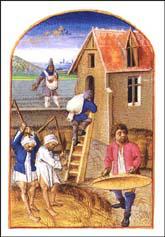The Normans
The people of Scandinavia (Norway, Denmark and Sweden) found it difficult to produce enough food their needs. In the 8th century Scandinavians, who became known as Vikings or Northmen, began to send out raiding parties in search of food and plunder. When they discovered the superior quality of land in Europe some Vikings decided not to return to Scandinavia.
The Vikings who stayed in France became known as the Normans (Northmen). The first great Norman leader was Rollo the Ganger. After a fierce battle in 911 between the French and the Normans, a peace-settlement was agreed. In exchange for Rollo becoming a Christian the Normans were granted their own lands on the French coast.
The Normans married local women and gradually adopted the French language. They sometimes fought for the French king but were an independent people and preferred to follow their own leader who became known as the Duke of Normandy.
The Normans were successful farmers but they still felt the need to raid other lands. The main reason for this was their belief in primogeniture - when a Norman died all his property was given to his eldest son. This often resulted in younger sons leaving to go in search of their own lands.
As Christians, Normans feared that when they died they would be punished for stealing land and for other crimes they had committed. To help protect themselves the Normans used some of the wealth they obtained from their raids to build churches and monasteries. Norman leaders also went on pilgrimages to the Holy Lands.
In 1035, Robert the Devil, fifth Duke of Normandy, died while on a pilgrimage to Jerusalem. Robert was a direct descendant of Rollo the Ganger. Traditionally, the duke's eldest son became the next leader. In Robert's case this proved a problem as he had not produced any sons in marriage. However, he did have an illegitimate son called William. Leading Normans decided that William, who was only seven years old at the time, was to become the new Duke of Normandy.

Primary Sources
(1) William the Conqueror, quoted by Ordericus Vitalis in The Ecclesiastical History (c. 1142)
The Normans, when under the rule of a kind but firm master... excelling all others in courage... they strive to conquer every enemy... They are eager for rebellion and ready for every sort of crime. They must therefore be restrained by the strong hand of justice. But if they are allowed to take their own course will be overwhelmed with poverty, shame and confusion.
(2) William of Malmesbury, The Deeds of the Kings of the English (c. 1140)
The Normans... can hardly live without war, fierce in attacking their enemies, and when force fails, ready to corrupt by bribery.
(3) Richard FitzNeal, Dialogue of the Exchequer (c. 1180)
After the conquest, those English who were left used to lie in wait for the dreaded and hated Normans. They killed them in secluded places.. The kings for some years inflicted the most terrible tortures on the English, yet without effect, till at length they imagined the following device. Wherever a Norman was found killed, if the killer didn't show himself or even betray himself by flight, then the whole of the district was fined.
(4) Laws introduced by William the Conqueror in 1070.
I forbid that anyone found guilty of murder or theft shall be hanged... but let his eyes be put out.
(5) William of Poitiers, Chronicle (c.1090)
The peasants... wanted to... make use of the woods, forests and waters. Each assembly of English people appointed two deputies who were to meet in order to press their case. But (William), learning of this, promptly sent a group of soldiers to scatter the peasant gathering. They arrested all the deputies and some other peasants, having first chopped off their hands and feet, they sent them back home to their families, helpless for the rest of their lives.
